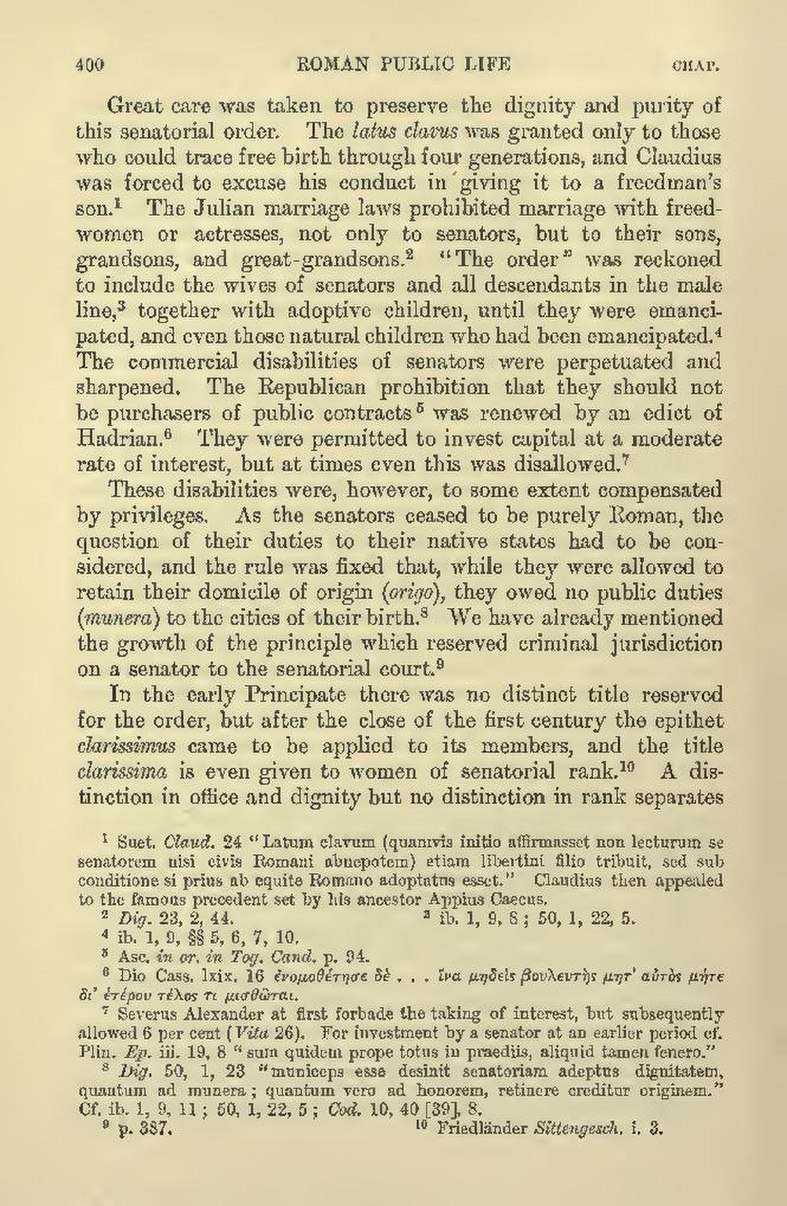Great care was taken to preserve the dignity and purity of this senatorial order. The latus clavus was granted only to those who could trace free birth through four generations, and Claudius was forced to excuse his conduct in giving it to a freedman's son.[1] The Julian marriage laws prohibited marriage with freed-*women or actresses, not only to senators, but to their sons, grandsons, and great-grandsons.[2] "The order" was reckoned to include the wives of senators and all descendants in the male line,[3] together with adoptive children, until they were emancipated, and even those natural children who had been emancipated.[4] The commercial disabilities of senators were perpetuated and sharpened. The Republican prohibition that they should not be purchasers of public contracts[5] was renewed by an edict of Hadrian.[6] They were permitted to invest capital at a moderate rate of interest, but at times even this was disallowed.[7]
These disabilities were, however, to some extent compensated by privileges. As the senators ceased to be purely Roman, the question of their duties to their native states had to be considered, and the rule was fixed that, while they were allowed to retain their domicile of origin (origo), they owed no public duties (munera) to the cities of their birth.[8] We have already mentioned the growth of the principle which reserved criminal jurisdiction on a senator to the senatorial court.[9]
In the early Principate there was no distinct title reserved for the order, but after the close of the first century the epithet clarissimus came to be applied to its members, and the title clarissima is even given to women of senatorial rank.[10] A distinction in office and dignity but no distinction in rank separates.], 8.]
- ↑ Suet. Claud. 24 "Latum clavum (quamvis initio affirmasset non lecturum se senatorem nisi civis Romani abnepotem) etiam libertini filio tribuit, sed sub conditione si prius ab equite Romano adoptatus esset." Claudius then appealed to the famous precedent set by his ancestor Appius Caecus.
- ↑ Dig. 23, 2, 44.
- ↑ ib. 1, 9, 8; 50, 1, 22, 5.
- ↑ ib. 1, 9, §§ 5, 6, 7, 10.
- ↑ Asc. in or. in Tog. Cand. p. 94.
- ↑ Dio Cass. lxix. 16 [Greek: enomothetêse de . . . hina mêdeis bouleutês mêt' autos mête di' heterou telos ti misthôtai
- ↑ Severus Alexander at first forbade the taking of interest, but subsequently allowed 6 per cent (Vita 26). For investment by a senator at an earlier period cf. Plin. Ep. iii. 19, 8 "sum quidem prope totus in praediis, aliquid tamen fenero."
- ↑ Dig. 50, 1, 23 "municeps esse desinit senatoriam adeptus dignitatem, quantum ad munera; quantum vero ad honorem, retinere creditur originem." Cf. ib. 1, 9, 11; 50, 1, 22, 5; Cod. 10, 40 [39
- ↑ p. 387.
